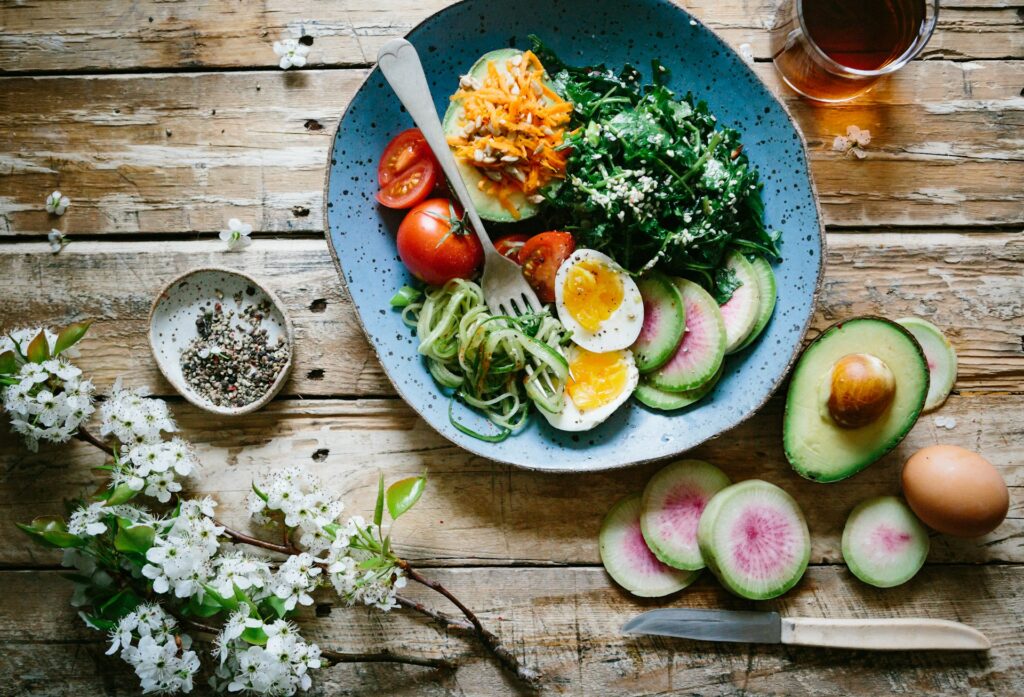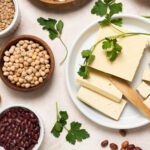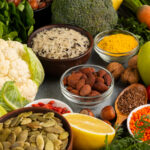
Table of Contents
Overview
In the quest for better health, many people are turning to healing foods—nutrient-dense, natural foods that provide more than just basic nutrition. These foods help prevent disease, support the body’s natural healing processes, and promote overall well-being. In this post, we’ll explore what healing foods are, highlight some of the most powerful examples, and explain how you can incorporate them into your diet for optimal health.
What Are Healing Foods?
Healing foods are whole, unprocessed foods that are packed with vitamins, minerals, antioxidants, and other essential nutrients. These foods support the body’s healing from within, boost the immune system, repair cellular damage, reduce inflammation, and help prevent chronic diseases such as heart disease, diabetes, and cancer. Unlike processed foods that often lack nutritional value, healing foods provide the body with what it needs to function optimally and stay healthy in the long run.
The Power of Antioxidants
Antioxidants are compounds found in various healing foods that protect cells from oxidative stress. Oxidative stress occurs when there is an imbalance between free radicals—unstable molecules that can damage cells—and antioxidants, which neutralize them. Free radicals are linked to aging and diseases like cancer and heart disease. Consuming antioxidant-rich foods helps reduce this cellular damage, making them an essential part of a healthful diet.
Top Antioxidant-Rich Foods
- Berries: Blueberries, strawberries, and raspberries are loaded with antioxidants, especially vitamin C and flavonoids. These compounds help reduce inflammation and protect against heart disease.
- Leafy Greens: Spinach, kale, and Swiss chard are rich in antioxidants such as vitamins A and C, supporting eye health, boosting the immune system, and promoting healthy skin.
- Nuts and Seeds: Almonds, walnuts, chia seeds, and flaxseeds are packed with vitamin E and selenium, powerful antioxidants that help protect against oxidative stress and inflammation.
Anti-Inflammatory Foods
Chronic inflammation is a major factor in many diseases, including arthritis, heart disease, and certain cancers. Anti-inflammatory foods help reduce inflammation in the body, supporting overall health and preventing disease progression. Incorporating these foods into your diet can help manage chronic conditions and improve your well-being.
Top Anti-Inflammatory Foods
- Turmeric: This bright yellow spice contains curcumin, a compound known for its powerful anti-inflammatory effects. Adding turmeric to your diet can help reduce joint pain, improve brain function, and lower the risk of heart disease.
- Fatty Fish: Salmon, mackerel, and sardines are rich in omega-3 fatty acids, which have anti-inflammatory properties that support heart health and improve mental well-being.
- Ginger: Known for its warming properties, ginger contains gingerol, an anti-inflammatory compound that helps reduce muscle pain, relieve nausea, and support digestion.
Immune-Boosting Foods
A strong immune system is your body’s first line of defense against infections, viruses, and diseases. To keep your immune system functioning at its best, it’s important to nourish it with foods that are rich in immune-boosting vitamins and minerals. Many healing foods are packed with nutrients that help enhance immune function and keep your body strong.
Top Immune-Boosting Foods
- Citrus Fruits: Oranges, grapefruits, lemons, and other citrus fruits are high in vitamin C, which helps boost the immune system and may reduce the duration of colds and flu.
- Garlic: Garlic is rich in allicin, a compound that enhances the immune system’s ability to fight off infections. Regular consumption of garlic can also support heart health.
- Yogurt: Probiotic-rich foods like yogurt help maintain a healthy gut, which is essential for a strong immune system. The beneficial bacteria in yogurt support digestion and improve your body’s ability to fight off pathogens.
Gut-Healing Foods
Your gut health is directly linked to your overall well-being. A healthy gut supports proper digestion, nutrient absorption, and immune function, while an unhealthy gut can lead to digestive issues, autoimmune diseases, and even mental health problems. Incorporating gut-healing foods into your diet can help restore balance in your gut microbiome and improve your overall health.
Top Gut-Healing Foods
- Fermented Foods: Kimchi, sauerkraut, and kefir are rich in probiotics, which support a healthy gut by replenishing beneficial bacteria and improving digestion.
- Bone Broth: Bone broth is rich in collagen, amino acids, and minerals that help heal the gut lining and reduce inflammation.
- Bananas: This versatile fruit is a prebiotic, providing food for the beneficial bacteria in your gut. Bananas also help soothe the stomach and promote regular bowel movements.
Simple Ways to Incorporate Healing Foods into Your Diet
Incorporating healing foods into your diet doesn’t have to be difficult. Here are some simple tips to get started:
- Start with Breakfast: Add berries, leafy greens, and nuts to your morning smoothie or oatmeal for a nutrient-packed start to your day.
- Spice Up Your Meals: Include turmeric, ginger, and garlic in your soups, stews, and stir-fries to enjoy their anti-inflammatory benefits.
- Eat More Fish: Aim to eat fatty fish like salmon or mackerel at least twice a week to reap the benefits of omega-3 fatty acids.
- Choose Smart Snacks: Snack on probiotic-rich yogurt, nuts, and fruits like bananas or citrus for a healthy, immune-boosting option.
- Sip on Bone Broth: Enjoy bone broth as a nourishing drink, or use it as a base for soups and stews to support gut health.
The Takeaway
Healing foods are more than just nutritious—they are powerful tools that help prevent disease, support healing, and promote overall well-being. By incorporating these nutrient-dense, whole foods into your daily diet, you can boost your immune system, reduce inflammation, and improve your gut health. The journey to better health starts with the choices you make at every meal, so embrace the power of healing foods and take control of your health from within.
Frequently Asked Questions
- What are healing foods?
- Healing foods are whole, unprocessed foods rich in nutrients such as vitamins, minerals, antioxidants, and other essential compounds. They support the body’s natural healing processes, boost immunity, reduce inflammation, and help prevent chronic diseases.
- How do antioxidants in healing foods benefit the body?
- Antioxidants protect the body’s cells from oxidative stress, which can lead to cellular damage and contribute to aging and diseases like cancer and heart disease. Consuming antioxidant-rich foods helps neutralize free radicals and reduce the risk of these conditions.
- Which foods are known for their anti-inflammatory properties?
- Turmeric, fatty fish (like salmon and mackerel), and ginger are some of the top anti-inflammatory foods. These foods help reduce chronic inflammation, which is linked to diseases such as arthritis, heart disease, and certain cancers.
- How can healing foods boost the immune system?
- Foods like citrus fruits, garlic, and probiotic-rich yogurt are packed with immune-boosting nutrients such as vitamin C, allicin, and beneficial bacteria. These nutrients enhance the immune system’s ability to fight off infections and support overall immune health.
- What are some gut-healing foods?
- Fermented foods like kimchi and sauerkraut, bone broth, and bananas are excellent for gut health. They support digestion, promote a healthy gut microbiome, and help heal the gut lining.
- Can healing foods prevent chronic diseases?
- Yes, regularly consuming healing foods rich in antioxidants, anti-inflammatory compounds, and immune-boosting nutrients can help prevent chronic diseases such as heart disease, diabetes, and cancer by supporting the body’s natural defenses and reducing inflammation.
- How can I easily incorporate healing foods into my daily diet?
- Start by adding berries, leafy greens, and nuts to your breakfast, including spices like turmeric and garlic in your meals, eating fatty fish a few times a week, snacking on yogurt and fruits, and sipping bone broth for gut health.
- Are healing foods suitable for everyone?
- Healing foods are generally suitable for most people, as they consist of whole, unprocessed, nutrient-dense options. However, individuals with specific allergies or dietary restrictions should tailor their choices accordingly, consulting with a healthcare professional if needed.












